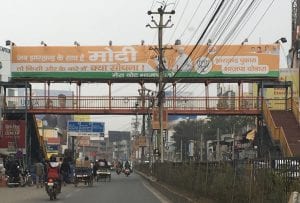
Jharkhand records 63.5% polling in first phase; test for BJP after Maha fiasco

The first of the five-phase polling began in Jharkhand on Saturday (November 30) morning. The state witnessed a record of 63.50% voters turnout in 13 of the 81 Assembly constituencies.
About 189 candidates, including 15 women nominees, state health minister Ramchandra Chandravanshi from Bishrampur and state Congress president Rameshwar Oraon from Lohardaga, were in the fray.
Polling was underway in Lohardaga, Manika, Latehar, Panki, Chatra, Gumla, Bishunpur, Daltonganj, Bishrampur, Chhatarpur, Hussainabad, Garhwa and Bhawanathpur.
Power at stake
The ruling Bharatiya Janata Party’s (BJP) national narrative focussed on Ayodhya verdict and Kashmir issue, failed to appease the voters. The saffron party hopes to retain power in the state even as there’s a strong anti-incumbency factor against the leadership of Chief Minister Raghubar Das. The BJP chose to build its campaigning strategy on Prime Minister Nandra Modi’s image.
Billboards in and around the state carried a phrase which says ‘when Modi is with Jharkhand, why think of anyone else.’

While the party’s work on controlling Naxal attacks and improving the road infrastructure and network gained some positive feedback, some key issues like unemployment, forest and Adivasi rights, failure of the public distribution system and action on mob lynching went unanswered.
“Building a temple or mosque is not going to fill our stomach. We need the government to focus on improving the lives and livelihood of the people. Hence, we (villagers) have voted accordingly,” said M D Azam, a villager in Hanhat, Lohardaga.
In another polling station in Kairo block in Lohardaga, Mangri Urang, a 32-year-old woman farmer said the villagers held a meeting on Thursday and based on the village panchayat chief’s order, they decided to support a party that promised on solving tribal rights.
The mood on the ground will set the tone for the rest of the four phases of the election that will last till December 20. With BJP losing power in Maharashtra, it gave more strength for the opposition parties to target the ruling government in Jharkhand.
“By spreading lies and showing development in the party posters, the BJP cheated the people of Jharkhand for years. Now the public will give them a fitting reply,” said former Chief Minister and Jharkhand Mukti Morcha (JMM) executive president Hemant Soren tweeted.
पलामू प्रमंडल में भाजपा की निक्कमी रघुवर सरकार की कुव्यवस्था का काला सच। झूठतंत्र फैलाकर, पोस्टर बैनर में विकास दिखाकर भाजपा ने सालों साल झारखंडी जनता को ठगा। अब जनता देगी इन्हें मुँह तोड़ जवाब।
चलो चलें…अब बदलें सरकार।#JharkhandMangeBadlav #JharkhandAssemblyPolls https://t.co/TR4MLRwKQO— Hemant Soren (@HemantSorenJMM) November 30, 2019
Also read | Poverty, hunger, deaths: Aadhaar, systems fail the poor in Jharkhand
Reports of violence
Other than a minor clash between two parties and a low-intensity blast in a forest area, the polling was largely peaceful.
In Palamau district, a clash broke out between Congress and BJP supporters near a polling station at Kosiyara village. Congress candidate KN Tripathi brandishes a gun during the clashes. BJP claimed that Tripathi allegedly stopped one of their supporters from going to the polling booths.
Meanwhile, in the Gulma district, the Naxals allegedly triggered an IED blast to disrupt the polling process. The district deputy commissioner Shahi Ranjan said, “Someone triggered a low-intensity blast near a culvert inside the deep jungles but no casualties or damages were reported.”
“We quickly brought the situation under control and as the blast was miles away from the polling booths, the polling went uninterrupted,” he added.
What political analysts say
While tribal issues are at the peak, the state government is building a different narrative, which, people in the villages are not able to connect with,” Dr Kiran Jha, a Political Science professor at Shyama Prasad Mukherjee University in Ranchi said.

She further says that the decision to change the Ranchi College’s name as Dr Shyama Prasad Mukherjee University amid protests from student community will go against the saffron party.
“Students are certainly unhappy about this. This will change the way young educated voters vote,” she says.
Meanwhile, Psephologist Sandeep Shastry noted that right from the time of Gujarat elections in 2017, the country witnessed different narratives for the state and national elections, because the local issues played out an important role in the Assembly polls.
Also read | To retain Jharkhand, BJP has to choose real issues over Hindutva
“A large section of voters seem to be unhappy with the ruling BJP government. Also, the party’s inability to maintain alliance at the regional level will hurt its chances,” he said. “Depending on the trends in first phase, one has to see whether the BJP will change its campaign strategies in the future and focus on the people centric state-focussed issues.


